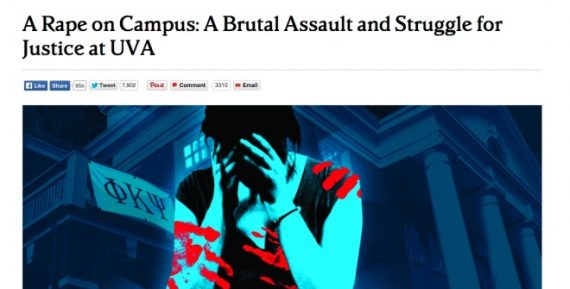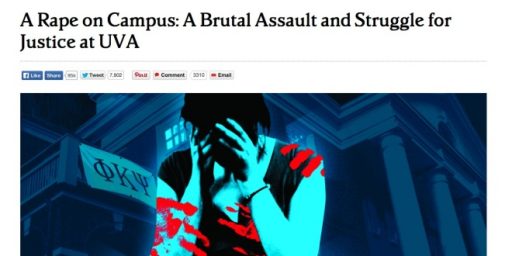University Of Virginia Fraternity Files Defamation Suit Against Rolling Stone Over Campus Rape Story
Rolling Stone faces yet another legal headache over last year's story about a campus rape that never took place.
The University of Virginia’s chapter of Phi Kappa Psi, the fraternity that was at the center of the allegations of campus rape that was the subject of a highly publicized Rolling Stone article that was quickly discredited after it was published, has filed a defamation suit against Rolling Stone and individuals involved in reporting and publishing the story:
The Phi Kappa Psi fraternity chapter at the University of Virginia filed a $25 million lawsuit Monday against Rolling Stone magazine, which published an article in 2014 that alleged a freshman was gang raped at the house during a party.
The lawsuit focuses on a Rolling Stone article titled “A Rape on Campus,” which detailed a harrowing attack on a freshman named Jackie at the Phi Psi house on Sept. 28, 2012. The article, written by Sabrina Rubin Erdely, described how Jackie was raped by seven men while two others watched in a second floor bedroom while a fraternity party raged downstairs. The article alleged that the attack was part of a hazing ritual at the long-time U-Va. fraternity.
The Washington Post found significant discrepancies in the Rolling Stone account, including that the fraternity did not host a party that night in 2012 and that a student identified by Jackie as her main attacker was never a member of the fraternity and did not attend U-Va.
Two investigations — by the Columbia University journalism school and the Charlottesville Police Department — later confirmed that there was no gang rape at the fraternity.
“The fraternity chapter and its student and alumni members suffered extreme damage to their reputations in the aftermath of the article’s publication and continue to suffer despite the ultimate unraveling of the story,” the Phi Psi chapter said in a statement Monday. “The article also subjected the student members and their families to danger and immense stress while jeopardizing the future existence of the chapter.”
Rolling Stone retracted the story in April, and the magazine’s editor, Will Dana, later resigned.
A spokesperson for Rolling Stone declined to comment Monday.
In July, three U-Va. alumni members of the Phi Psi fraternity filed a federal lawsuit in New York against Rolling Stone. One of the fraternity members, George Elias, wrote in the lawsuit that he lived in a second floor bedroom of the house in 2012, which led members of the U-Va. community to assume he possibly took part in the alleged gang rape.
The magazine also faces a $7.5 million federal lawsuit filed by Nicole Eramo, a U-Va. associate dean who assists sexual assault survivors on campus and who alleges that she was vilified in the Rolling Stone account.
The filing of this lawsuit now, which joins the suits filed earlier this year by Associate Dean Nicole Eramo and a separate suit filed by individual fraternity members, isn’t entirely surprising. Under Virginia law, the statute of limitation for defamation related claims is generally one year from the date of publication, and that time period will expire on November 19th, the one year anniversary of the publication of the Rolling Stone piece. It’s possible that we’ll see some other litigation filed over the next week or so given that deadline, perhaps even by the University itself, given the impending deadline, but with the filing of this lawsuit we have before differing courts three separate lawsuits relating to the incident. Eramo’s lawsuit, for example, was filed in U.S, District Court in Virginia, while the fraternity member’s suit was filed in the District Court in New York where the magazine’s headquarters are located. This lawsuit, on the other hand, is at least currently pending in the Circuit Court for the City of Charlottesville, the relevant trial-level state court in Virginia. Because of the amount in controversy, it’s possible that one or more of the Defendants could see to remove the case to Federal Court and then seek to consolidate all three cases for trial given the common fact issues. The Defendants may also try to remove the cases from Virginia entirely to avoid the possibility of facing a jury pool that isn’t likely to be very sympathetic to a news organization and a reporter and editor from New York City. Those legal moves, though, are something the Defendants will have to decide to pursue and it will be up to the relevant Judges to decide whether or not to grant them, with the exception of the possible removal of the state court action to Federal Court, which would likely be available as a matter of law if the Defendants choose to go that route.
The other option for the Defendants, of course, would be to resolve all of these matters out of court rather than engaging in the expense and potential exposure that trial would bring given the facts of this case. While the initial report had a powerful impact, including leading University of Virginia officials to temporarily suspend all Greek activity on campus even by chapters not implicated in the report, it quickly fell into disrepute as other reporters began looking at the details of the story that was published. The Washington Post, for example, published a detailed report after several weeks of on campus investigation that made it seem readily apparent that the alleged assault never actually took place, and that the reporter and editor involved in the story never bothered to really investigate by “Jackie,” the woman who was at the center of their report. Several of the friends of “Jackie” that were referenced in the original article said that they had doubts about the story she had related to them from the beginning. The Post’s investigation also established that the physical description of the fraternity house in the article did not match what the building looked, and that there was in fact no party on the night the assault allegedly took place or at any time near that date. It was later revealed that the author of the Rolling Stone piece didn’t bother to check on these items, in no small part because Jackie had apparently asked her not to talk with the alleged rapist or anyone at the fraternity. As the coup de grace, the Columbia Journalism Review released a detailed report on the incident and found numerous violations of journalistic ethics and good practices byRolling Stone and by Sabrina Rubin Erdely, the reporter behind the story. In response, the magazine has essentially rescinded the story, although nobody associated with the original report has been fired or disciplined. As UCLA law professor Eugene Volokh has detailed in several blog posts over the past year — see here, here, and here — Rolling Stone and the authors of this piece have at the very least subjected themselves to significant legal exposure by their actions. Based on this, and the potential costs of litigating all three of these cases to trial and beyond, settlement would seem to be in their interest if it is at all possible.
Here’s the opinion:




Nobody? Now I know why I don’t read Rolling Stone.
I’m not too sympathetic to these guys. They got taken in by a sob story, decided they had an exclusive, and eagerly ran to push it out before double-checking anything.
One would think these people had never been approached by beggars on the street. Amazing how many of them “just need a little money to get back home” and amazing how many of them I’ve seen year after year after year……
Boy, I hate to have to side with a frat against journalists, but the Stone blew this about six different ways.
@michael reynolds:
Yup. Rolling Stone did the seemingly impossible – they created sympathy for frats.
I’d have thought that double checking a story is as automatic in journalism as double checking your calculations is in engineering.
@george:
No, not if the story is too juicy to jeopardize with a fact check. That is apparently what happened here. The RE editors wanted to believe it, so they didn’t verify it.
@CSK:
Ah. Well, I hope it turns into an expensive mistake for them, if only as a precedent.